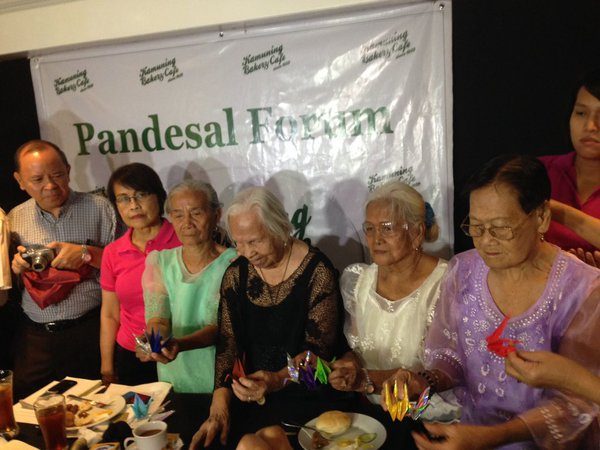SUMMARY
This is AI generated summarization, which may have errors. For context, always refer to the full article.

MANILA, Philippines – More than 70 years after the end of World War II, the lolas (grandmothers) of Lila Pilipina are still waiting for their pleas to be heard.
Lila Pilipina, an organization of World War II comfort women, is asking President Benigno Aquino III to bring up their plight during the state visit of Emperor Akihito and Empress Michiko to the Philippines on January 26 to 30.
“We want to express the commitment of the lolas to struggle for justice,” Lila Pilipina executive director Retchilda Extremadura said in a media forum on Friday, January 22.
The lolas have 3 demands: a public apology, an inclusion of the realities of comfort women in history, and just compensation from the Japanese government. (READ: Comfort women: ‘Hustisya para sa mga lola’)
Lila Pilipina, founded in 1992, estimates that at least 1,000 Filipinos became victims of the Japanese military’s ‘comfort women’ system during World War II.
Out of the 174 members of the group, 104 have passed away. Most of the 70 women left are not in good health.
Struggle for justice
One of the lolas, 85-year-old Narcisa Claveria, said she has long been fighting for their issues to be addressed.
“Dapat itong pagkaapi namin, kanya nang tugunan, hindi yung napipilitan lang… Wala pa kaming natatanggap na hustisya. Ang laking nawala sa amin. Nawalan kami ng dignidad. Hindi kami nakapag-aral. Trauma lang ang inabot namin sa kamay nang mga sundalong Hapon,” Claveria said.
(President Aquino should address the oppression we suffered, not just because he’s forced to. We haven’t received any justice. We have lost a lot. We lost our dignity. We weren’t able to study. The only thing we got from the Japanese soldiers was trauma.)
Claveria was joined by Hilaria Bustamante, 89; Felicidad delos Reyes, 87; and Estelita Dy, 85.
There were reportedly around 200,000 Asian victims, including women and girls from the Philippines, who were forced into sexual slavery in “comfort stations” by the Japanese military during World War II.
Ricardo Jose, a History professor and director of the Third World Studies Center, said the case of the Filipino comfort women is a historical wrong that has not been righted. He based his perspective on documents, verified facts, and witnesses.
He also said it is his job as a historian to educate people about the wrongs of the past to prevent them from being repeated in the future generations. (READ: Class and the politics of memory in post-war Asia)
“It is not a case of rape but a case of sexual slavery… It is not fully responded to by both government and it has not been fully resolved,” Jose added.
‘Do not trivialize’
Gabriela Representative Emmi De Jesus said Aquino should not trivialize the comfort women’s issues and must raise their concerns when the Japanese emperor and empress visit.
On December 28, 2015, South Korea and Japan reached an agreement on their dispute over wartime sex slaves. But in a statement, De Jesus said it was rejected by Korean victims because they were not consulted.
“The Gabriela solons fear Aquino is bound to do a similar exclusionary action because for 6 years under his administration, the issue was never tackled by any agency,” added the statement.
Earlier in January, Aquino said that he is open to seeking further assistance from Japan for the Filipino former comfort women and that he finds no harm in discussing the issue with them. (READ: Tokyo to propose new fund for former ‘comfort women’ – Reports)
Continuing the fight
Despite the uphill battle, the lolas of Lila Pilipina remain hopeful that they will succeed in their advocacy, and that the Imperial couple’s visit will provide an opportunity for Aquino to raise their concerns.
“Hopefully, Aquino will remember that he had a mother and he had a grandmother, and he must represent the cause of the Filipino comfort women,” Extremadura said.
The group also believes that even if Emperor Akihito is not involved with the policies of his country, he is an influential man who can persuade the Japanese people and push the Japanese government to give justice.
“Mananalo kami kasi lumalaban kami (We will win because we fight),” they also said.
On January 19, De Jesus said they filed House Resolution 2618 to look into Aquino’s policy direction and diplomatic action to resolve the issue of Filipino comfort women, particularly regarding their demands for official acknowledgement, public apology, and reparations from the Japanese government.
Justice and apology?
Many of the comfort women hope to receive an apology. Japan, on the other hand, has apologized in the past, but its messages have been as mixed as people’s reception to them.
Prime Minister Shinzo Abe’s latest statement, in particular, had mixed reactions. Unlike past statements from Tomiichi Murayama and Yohei Kono, Abe’s approach was viewed as too conservative. (READ: Should Japan apologize for WWII?)
Akihito, on the other hand, has expressed “profound remorse” for WWII, and urged fellow Japanese to remember the war. (READ: Emperor Akihito turns 82 urging Japan to remember war).
After these apologies, other countries like South Korea released statements about their governments’ reactions. However, scholars and advocates noted that the Philippine government has been quiet about the apologies. They also observed no nationwide action to rally behind comfort women. – with a report by Bea Orante/Rappler.com
Jene-Anne Pangue is a Mover who works as a medical technologist at the Divine Word Hospital in Tacloban City.
Add a comment
How does this make you feel?
There are no comments yet. Add your comment to start the conversation.